常见时态及其区别
图片预览

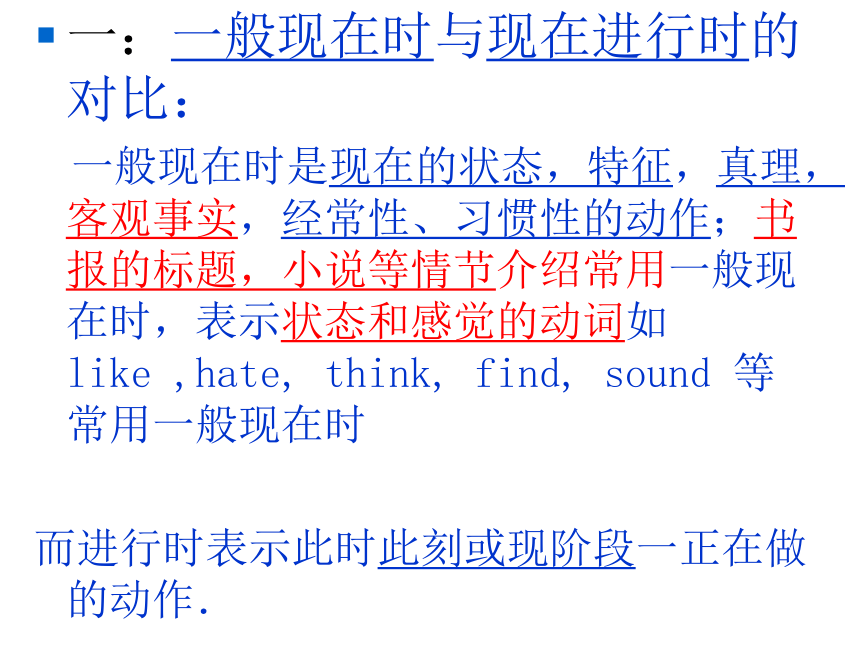
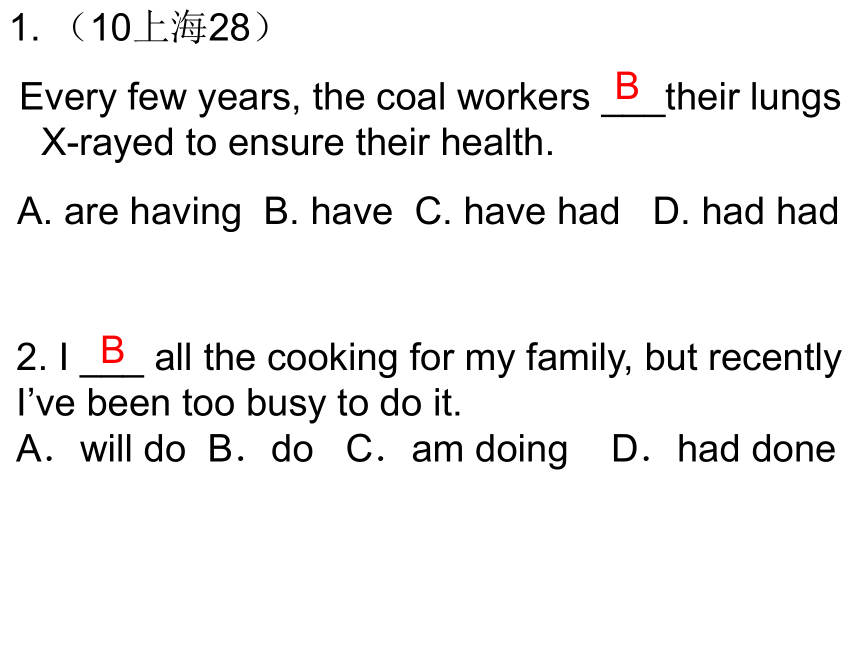
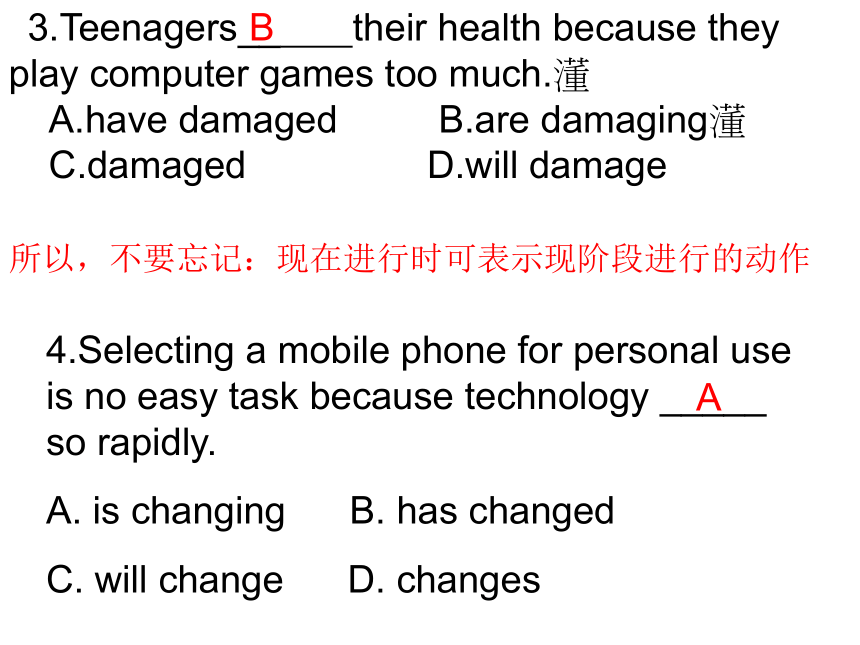
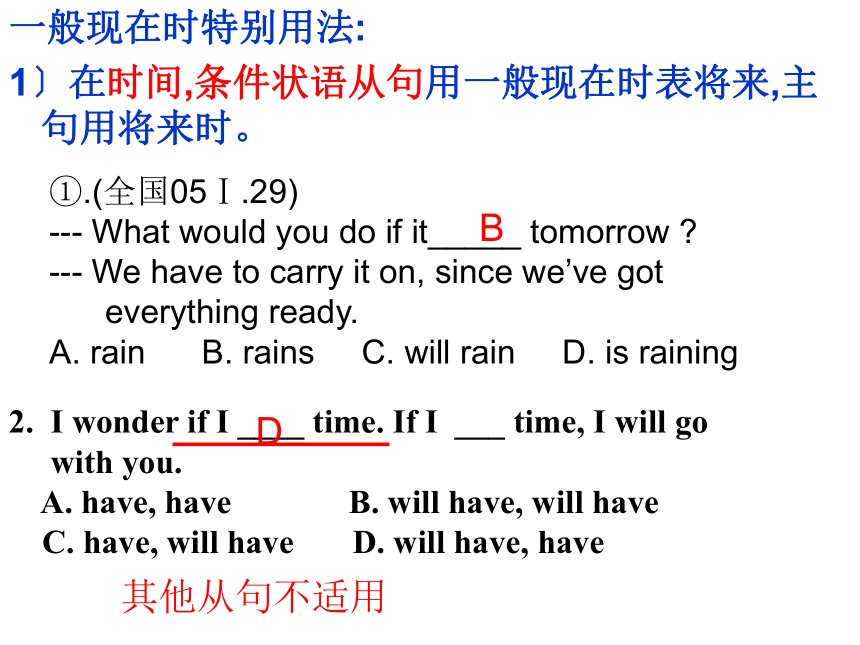
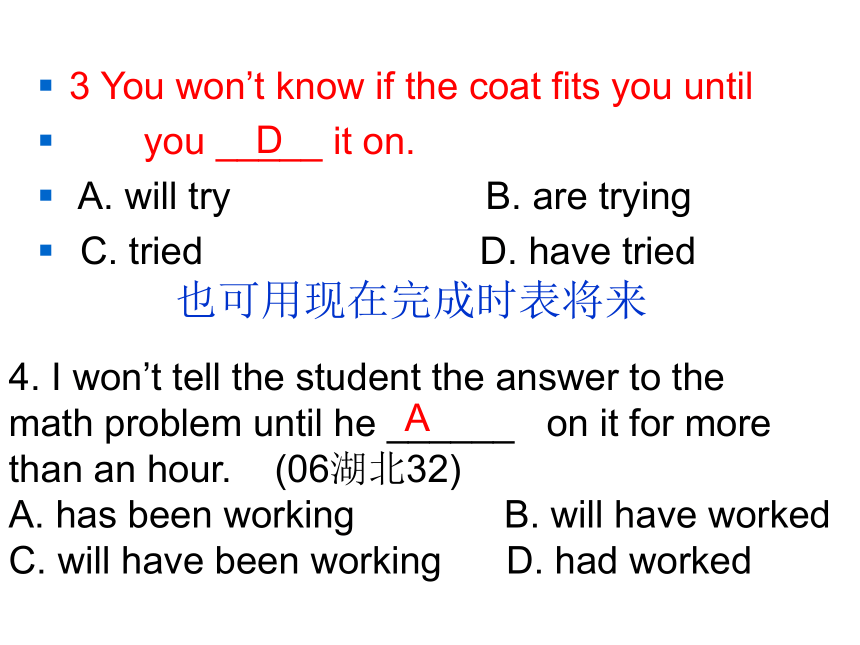
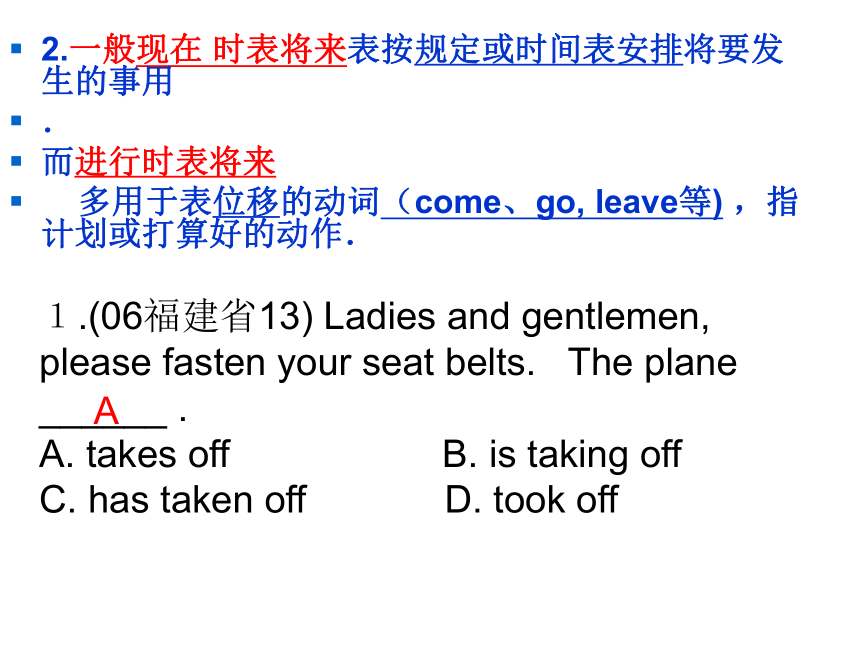


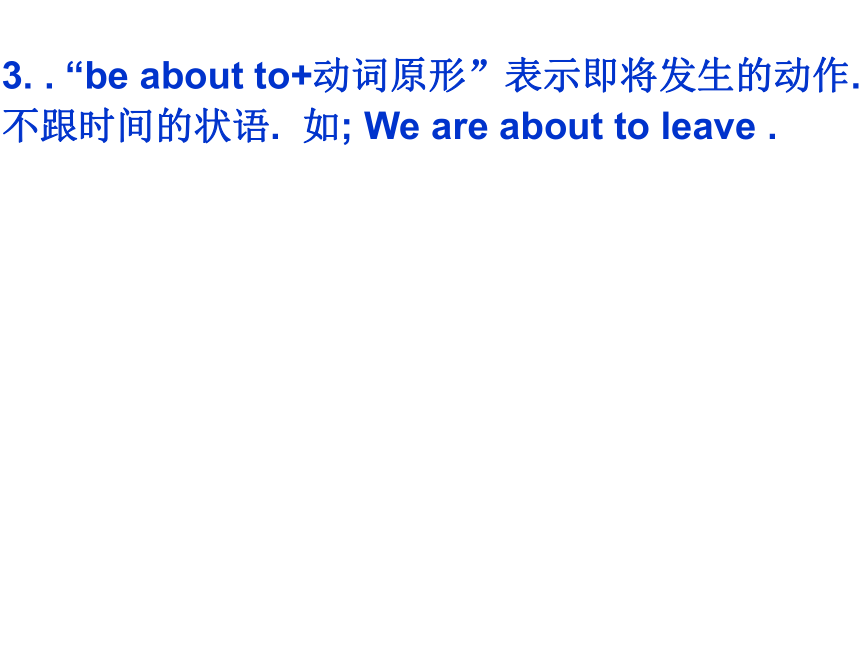
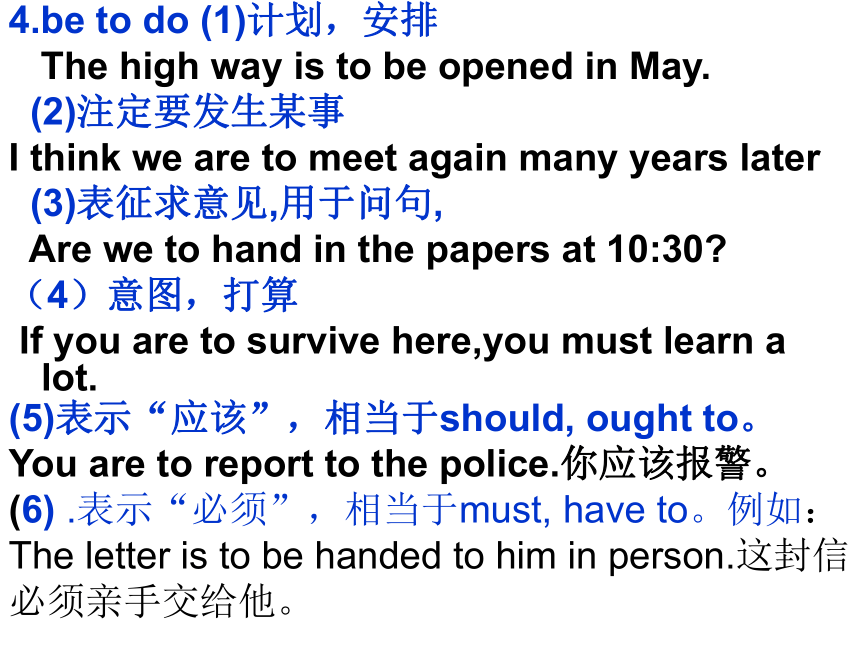
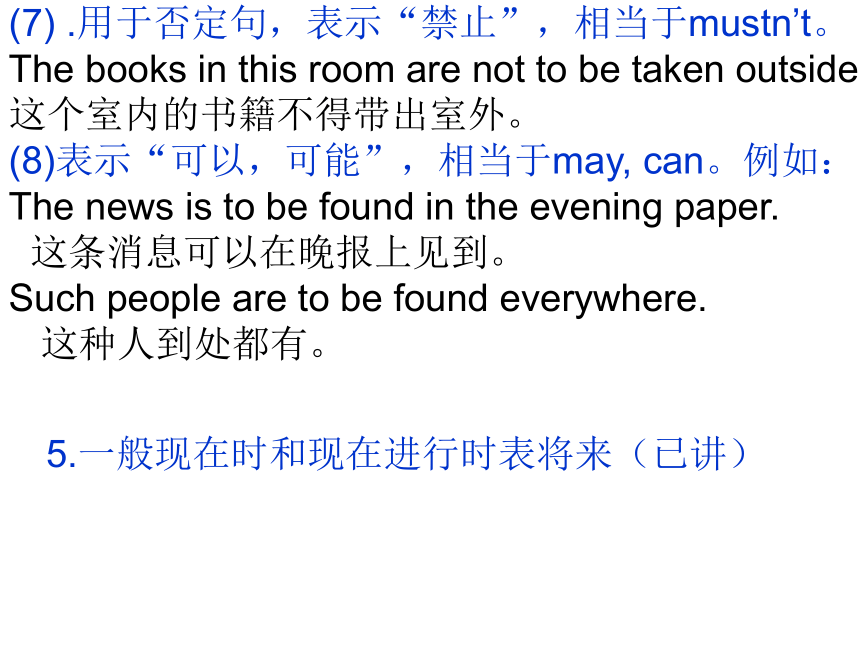
文档简介
(共43张PPT)
常见时态用法及其区别
一:一般现在时与现在进行时的对比:
一般现在时是现在的状态,特征,真理,客观事实,经常性、习惯性的动作;书报的标题,小说等情节介绍常用一般现在时,表示状态和感觉的动词如like ,hate, think, find, sound 等常用一般现在时
而进行时表示此时此刻或现阶段一正在做的动作.
B
1. (10上海28)
Every few years, the coal workers ___their lungs X-rayed to ensure their health.
A. are having B. have C. have had D. had had
2. I ___ all the cooking for my family, but recently
I’ve been too busy to do it.
A.will do B.do C.am doing D.had done
B
4.Selecting a mobile phone for personal use is no easy task because technology _____ so rapidly.
A. is changing B. has changed
C. will change D. changes
A
3.Teenagers__ their health because they play computer games too much.
A.have damaged B.are damaging
C.damaged D.will damage
B
所以,不要忘记:现在进行时可表示现阶段进行的动作
一般现在时特别用法:
1〕在时间,条件状语从句用一般现在时表将来,主句用将来时。
①.(全国05Ⅰ.29)
--- What would you do if it_____ tomorrow
--- We have to carry it on, since we’ve got
everything ready.
A. rain B. rains C. will rain D. is raining
B
2. I wonder if I ____ time. If I ___ time, I will go
with you.
A. have, have B. will have, will have
C. have, will have D. will have, have
D
其他从句不适用
3 You won’t know if the coat fits you until
you _____ it on.
A. will try B. are trying
C. tried D. have tried
4. I won’t tell the student the answer to the
math problem until he ______ on it for more than an hour. (06湖北32)
A. has been working B. will have worked
C. will have been working D. had worked
也可用现在完成时表将来
D
A
2.一般现在 时表将来表按规定或时间表安排将要发生的事用
.
而进行时表将来
多用于表位移的动词(come、go, leave等) ,指计划或打算好的动作.
1.(06福建省13) Ladies and gentlemen, please fasten your seat belts. The plane ______ .
A. takes off B. is taking off
C. has taken off D. took off
A
2.(06四川22) Look at the timetable. Hurry up! Flight 4026 _____off at 18:20.
A. takes B. took
C. will be taken D. has taken
3. I’ve won a holiday for two to Florida. I ____ my mum.
am taking B. have taken
C. take D. will have taken
A
A
二.一般将来时(will/shall+动原):
1.一般用法:
一般将来时基本用法:表示单纯的将来事实e.g.
We shall have a lot of rain next month.
2. be going to:
1)即将发生的或最近打算进行的事
We are going to have a meeting today .
2〕表示迹象表明要发生某事
Look at the dark clouds. It’s going to rain.
注意:表示临时决定做某事而未事先考虑用will, 不用 be going to
--Ann is in hospital.
--Oh,really I didn’t know. I’ll go and visit her.
3. . “be about to+动词原形”表示即将发生的动作.
不跟时间的状语. 如; We are about to leave .
4.be to do (1)计划,安排
The high way is to be opened in May.
(2)注定要发生某事
I think we are to meet again many years later
(3)表征求意见,用于问句,
Are we to hand in the papers at 10:30
(4)意图,打算
If you are to survive here,you must learn a lot.
(5)表示“应该”,相当于should, ought to。
You are to report to the police.你应该报警。
(6) .表示“必须”,相当于must, have to。例如: The letter is to be handed to him in person.这封信必须亲手交给他。
5.一般现在时和现在进行时表将来(已讲)
(7) .用于否定句,表示“禁止”,相当于mustn’t。
The books in this room are not to be taken outside.
这个室内的书籍不得带出室外。
(8)表示“可以,可能”,相当于may, can。例如:
The news is to be found in the evening paper.
这条消息可以在晚报上见到。
Such people are to be found everywhere.
这种人到处都有。
1.(05全国II,8)
--Did you tell Julia about the result
--Oh,no, I forget. I ____ her now.
A. will be calling B. will call
C. are going to call D. am to call
2. (05重庆28)
--What are you going to do this afternoon
--I am going to the cinema with some friends. The film______ quite early ,so we _____ to the book store after that.
A. finished; are going B. finished; go
C. finishes; are going D.will finish; go
B
C
3.--Look at the black clouds! It _____ soon.
--Sure. If only we _____ out.
A. is about to rain; hadn’t come
B. is to rain; won’t start
C. will rain; haven’t started
D. is going to rain; hadn’t come
D
4. As early as his second film, Chaplin had developed his own manner of acting, the one that ___ world famous.
A. would become B. became
C. was to become D. had become
5.The final examination ___early July.
A.is to be held B. is to be taken place
C. is going to hold D. will be to take place
6.I ____ to bed when there was a knock at the door.
A.went B. am going to
C. was to go D. was about to go
C
A
D
7.----____ we ____ again next week
----Yes, let’s make it next Wednesday.
A. Are; to meet B. Shall; be to meet
C. Will; meet D. Are; meeting
8. As students, we ____.
A. won’t smoke B. are not to smoke
C. aren’t smoking D. don’t smoke
A
B
三.将来进行时(will/shall+be + v--ing)
1.基本用法:表示将来某时间点、某时间段正在进行的动作,e.g.
When I get home at 9:00 tomorrow, my son will be watching TV.
I shall be working this time next year
2.表示按计划或安排要发生的动作,e.g.
①I’ll be seeing Tom tomorrow .
②We’ll be visiting London next week.
3.用于问句,表客气或委婉的语气.e.g.
①Will you be having some tea
②When will you be paying back my money
思考(10浙江5)
If you plant watermelon seeds in the spring, you fresh watermelon in the fall.
A.eat B.would eat
C.have eaten D.will be eating
D
–Guess what, we’ve got our visas for a short-term visit to the UK this summer.
--How nice! You a different culture then.
will be experiencing B. have experienced
C.have been experiencing D. will have experience
A
四.将来完成时(will/shall+have + p.p.)
1.基本用法:既表示到将来某一时间为止势必会完成的动作或预计要完成的动作,e.g.
When we get there, she’ll have gone to work.
2.by( the end of )+将来时间,句中谓语用将来完成时,e.g.
①We will have learnt 3,000 words by the end of next term.
②By 8:00a.m. tomorrow, we will have arrived the park.
3.by the time+一般现在时,主句中谓语用将来完成时,e.g.
By the time he comes back, we will have repaired the machine.
五、一般过去时和过去进行时
(重要考查点)
一般过去时: 表过去做了某事(动作已完成)
过去进行时:过去进行时表示过去某一时刻,某一阶段正在进行的动作 Ex. 1.(07福建21)
__ I saw Jane and her boyfriend in the park at eight yesterday evening.
__ Impossible. She_____ TV with me in my
home.
A. watched B. had watched
C. would watched D. was watching
暗含了时间: at eight o’clock yesterday.
2.(07四川30)
__ Did you see a man in black pass by just now
__ No,sir. I _____ a newspaper.
A. read B. was reading
C. would read D.am reading
3. Shirley _____ a book about China last year
but I don’t know whether she ______it.
A. wrote; has finished
B. was writing; has finished
C. was writing ;had finished
D. wrote; will finish
某一阶段正在
进行的动作
4. Tom _____ into the house when no one ______
A. slipped; was noticing B.had slipped; noticed
C. slipped; had noticed D. was slipping; noticed
六.一般过去时和现在完成时
一般过去时: 只表单纯过去的动作或状态,
和现在不发生联系,可与表过去的时间状语连用.
现在完成时: 表示某一已完成的动作对
现在造成的影响或结果,强调的是现在的情况.
1.(06重庆31)
I _____ in London for many years , but I’ve never regretted my final decision to move back to China.
A. lived B. was living
C.have lived D. had lived
2. (2010浙江卷)For many years, people ___electric
cars. However, making them has been more difficult
than predicted.
A.had dreamed of B.have dreamed of
C.dreamed of D.dream of
3.(06福建31) The moment the 28th Olympic Games _____ open ,the world cheered.
A declared B.have been declared
C.have declared D.were declared
1) 现在完成时(it 作主语时,还可用一般现在时)+since+ 一般过去时
①I haven’t seen her since last week.
②It is/has been 3 years
since I last saw you
2〕句中有so far/ up to now/until now/ in the past (last)few years(months… )/等短语则句中谓语用现在完成时,e.g.
①So far there has been no news.
③In the past two years I’ve seen him three times.
⑤Up to now, the work has been very easy.
2.用现在完成时的典型场合:
3〕“It/This/That is the first (second/third…)time+that从句”
It/This/That is the first time that I have come to Zhejiang.
4)“It/This/That is the +最高级… + that从句”从句中谓语用现在完成时,e.g.
It/This/That is the most interesting book that I have ever read.
(注:以上句型把is改为was,则从句时态相应改为过去完成时态)
(10湖南34)
I'm tired out. . I all afternoon and I don't seem
to have finished anything.
A. shopped B. have shopped
C. had shopped D. have been shopping
七.现在完成进行时和现在完成时
现在完成时: 表动作已完成,强调动作的结果.
现在完成进行时: 表动作从过去发生一直持续到
现在,现在还在进行.往往跟一段时间状语连用,
2. The telephone ____ four times in the past hour, and each time it was for my roommate.
A. has rung B. has been ringing
C. had rung D. rang
3. Now that she is out of a job, Lucy _____ going back to school, but she hasn’t decided yet. (04北京)
A Had considered B. has been considering
C. Considered D. is going to consider
八. 现在完成时和过去完成时(重要考查点)
现在完成时: 表延续到现在或同现在有关的动作,
句中不可有过去特定时间的状语.
过去完成时: 过去的过去(相对的时态)
1.(07北京32) I got caught in the rain and
my suit ______.
A. has ruined B. had ruined
C. has been ruined D.had been ruined
2.(07安徽26)
They became friends again that day. Until then,
they______ to each other for nearly two years.
didn’t speak B. hadn’t spoken
C. haven’t spoken D.haven’t been speaking
3.(07上海30)
With the development of high technology ,more
and more new substances______ in the past
years.
A.discovered B.have discovered
C.had been discovered D.have been dicovered
4.(07北京海淀)
I was now attracted by books. By the end of
that summer, I _____ over 20 novels.
will have read B have read
C. had read D .has read
3.一些特殊句型中的过去完成时:
1〕“It/This/That was the first (second/third…)time+that从句”
或“It/This/That was the +最高级… + that从句”从句中谓语用过去完成时。
2〕by+过去时间,句中谓语用过去完成时,e.g.
①We had learnt 3,000 words by the end of last term.
②By 8:00a.m. yesterday, we had arrived the park.
3〕before/when/by the time+一般过去式,主句中谓语用过去完成时,e.g.
By the time he came back, we had repaired the machine.
4〕No sooner + had+主语+p.p. +than
Hardly /Scarcely + had+主语+p.p. + when +一般过去时
①No sooner had he gone to the garden than his son went to play with his classmates.
②Hardly had he heard the news when he cried
5. I had wanted/thought/hoped/planed/meant /expected/ intendede/supposed表示过去未曾实现的愿望、打算、想法等e.g.
①I had meant to come, but something happened.(= I meant to have come, but something happened. )
②I had intended to speak at the meeting, but time didn’t permit. (= I intended to have spoken at the meeting, but time didn’t permit. )
五. 过去完成进行时和过去进行时
过去完成进行时:强调动作在过去某一时刻之前
一直在持续.
过 去 进 行 时:强调的是过去某一时刻正在进
行的动作.
1.I first met Jimmy five years ago, when we
______ for an English newspaper together.
A. had worked B. were working
C.had been working D. have worked
2.---Was the driving pleasant when you
vacationed in Mexico last summer
---No, it ______ for four days when we arrived,
so the roads were very muddy.
A. was raining B. would be raining
C. had been raining D.has rained
六. 过去完成进行时和现在完成进行时
过去完成进行时: 以过去某一时间为前提
现在完成进行时: 以现在为前提
1.(05江苏29)
They _____ on the program for almost one week
before I joined them, and now we _______ it
as no good results have come out so far.
A. had been working; are still working
B.had worked; were still working
C.have been working; have worked
D. have worked; are still working.
2. The water in the river is rising, because
it ______ all day.
A. rained B. had rained
C.has been raining D.had been raining.
3.--Have you seen Bob recently
--No, but I was told that he _____ for
a new job all through the summer.
A. has been looking B. had been looking
C. is looking D. was looking
注意:1.过去进行时描述当时正在进行或持续进行, 它的暂时性,持续性和未完成性,后者则侧重于事实.
1).---- I’m sorry I shouldn’t have been so rude to you.
-----You ____ your temper but that’s OK.
A. have lost B. were lost
C. did lose D. were losing
2). I don’t think Jim saw me. He _____ into space.
A. Just stared B. was just staring
C. Has just stared D. had just stared
2.过去进行时多用于提供故事发生的时间背景:
1.As she _____ (read ) the newspaper, Granny _____(fall) asleep.
2. Nancy _______ (make) a dress when she _____ (cut) her finger.
3.礼貌过去进行时:
过去进行时也可表示现在使语气更委婉、客气, ① I was wondering if you could give me a lift. ②We were hoping you would stay with us.能这样用的动词主要限于want, wonder , think, hope, intend等少数动词。)
常见时态用法及其区别
一:一般现在时与现在进行时的对比:
一般现在时是现在的状态,特征,真理,客观事实,经常性、习惯性的动作;书报的标题,小说等情节介绍常用一般现在时,表示状态和感觉的动词如like ,hate, think, find, sound 等常用一般现在时
而进行时表示此时此刻或现阶段一正在做的动作.
B
1. (10上海28)
Every few years, the coal workers ___their lungs X-rayed to ensure their health.
A. are having B. have C. have had D. had had
2. I ___ all the cooking for my family, but recently
I’ve been too busy to do it.
A.will do B.do C.am doing D.had done
B
4.Selecting a mobile phone for personal use is no easy task because technology _____ so rapidly.
A. is changing B. has changed
C. will change D. changes
A
3.Teenagers__ their health because they play computer games too much.
A.have damaged B.are damaging
C.damaged D.will damage
B
所以,不要忘记:现在进行时可表示现阶段进行的动作
一般现在时特别用法:
1〕在时间,条件状语从句用一般现在时表将来,主句用将来时。
①.(全国05Ⅰ.29)
--- What would you do if it_____ tomorrow
--- We have to carry it on, since we’ve got
everything ready.
A. rain B. rains C. will rain D. is raining
B
2. I wonder if I ____ time. If I ___ time, I will go
with you.
A. have, have B. will have, will have
C. have, will have D. will have, have
D
其他从句不适用
3 You won’t know if the coat fits you until
you _____ it on.
A. will try B. are trying
C. tried D. have tried
4. I won’t tell the student the answer to the
math problem until he ______ on it for more than an hour. (06湖北32)
A. has been working B. will have worked
C. will have been working D. had worked
也可用现在完成时表将来
D
A
2.一般现在 时表将来表按规定或时间表安排将要发生的事用
.
而进行时表将来
多用于表位移的动词(come、go, leave等) ,指计划或打算好的动作.
1.(06福建省13) Ladies and gentlemen, please fasten your seat belts. The plane ______ .
A. takes off B. is taking off
C. has taken off D. took off
A
2.(06四川22) Look at the timetable. Hurry up! Flight 4026 _____off at 18:20.
A. takes B. took
C. will be taken D. has taken
3. I’ve won a holiday for two to Florida. I ____ my mum.
am taking B. have taken
C. take D. will have taken
A
A
二.一般将来时(will/shall+动原):
1.一般用法:
一般将来时基本用法:表示单纯的将来事实e.g.
We shall have a lot of rain next month.
2. be going to:
1)即将发生的或最近打算进行的事
We are going to have a meeting today .
2〕表示迹象表明要发生某事
Look at the dark clouds. It’s going to rain.
注意:表示临时决定做某事而未事先考虑用will, 不用 be going to
--Ann is in hospital.
--Oh,really I didn’t know. I’ll go and visit her.
3. . “be about to+动词原形”表示即将发生的动作.
不跟时间的状语. 如; We are about to leave .
4.be to do (1)计划,安排
The high way is to be opened in May.
(2)注定要发生某事
I think we are to meet again many years later
(3)表征求意见,用于问句,
Are we to hand in the papers at 10:30
(4)意图,打算
If you are to survive here,you must learn a lot.
(5)表示“应该”,相当于should, ought to。
You are to report to the police.你应该报警。
(6) .表示“必须”,相当于must, have to。例如: The letter is to be handed to him in person.这封信必须亲手交给他。
5.一般现在时和现在进行时表将来(已讲)
(7) .用于否定句,表示“禁止”,相当于mustn’t。
The books in this room are not to be taken outside.
这个室内的书籍不得带出室外。
(8)表示“可以,可能”,相当于may, can。例如:
The news is to be found in the evening paper.
这条消息可以在晚报上见到。
Such people are to be found everywhere.
这种人到处都有。
1.(05全国II,8)
--Did you tell Julia about the result
--Oh,no, I forget. I ____ her now.
A. will be calling B. will call
C. are going to call D. am to call
2. (05重庆28)
--What are you going to do this afternoon
--I am going to the cinema with some friends. The film______ quite early ,so we _____ to the book store after that.
A. finished; are going B. finished; go
C. finishes; are going D.will finish; go
B
C
3.--Look at the black clouds! It _____ soon.
--Sure. If only we _____ out.
A. is about to rain; hadn’t come
B. is to rain; won’t start
C. will rain; haven’t started
D. is going to rain; hadn’t come
D
4. As early as his second film, Chaplin had developed his own manner of acting, the one that ___ world famous.
A. would become B. became
C. was to become D. had become
5.The final examination ___early July.
A.is to be held B. is to be taken place
C. is going to hold D. will be to take place
6.I ____ to bed when there was a knock at the door.
A.went B. am going to
C. was to go D. was about to go
C
A
D
7.----____ we ____ again next week
----Yes, let’s make it next Wednesday.
A. Are; to meet B. Shall; be to meet
C. Will; meet D. Are; meeting
8. As students, we ____.
A. won’t smoke B. are not to smoke
C. aren’t smoking D. don’t smoke
A
B
三.将来进行时(will/shall+be + v--ing)
1.基本用法:表示将来某时间点、某时间段正在进行的动作,e.g.
When I get home at 9:00 tomorrow, my son will be watching TV.
I shall be working this time next year
2.表示按计划或安排要发生的动作,e.g.
①I’ll be seeing Tom tomorrow .
②We’ll be visiting London next week.
3.用于问句,表客气或委婉的语气.e.g.
①Will you be having some tea
②When will you be paying back my money
思考(10浙江5)
If you plant watermelon seeds in the spring, you fresh watermelon in the fall.
A.eat B.would eat
C.have eaten D.will be eating
D
–Guess what, we’ve got our visas for a short-term visit to the UK this summer.
--How nice! You a different culture then.
will be experiencing B. have experienced
C.have been experiencing D. will have experience
A
四.将来完成时(will/shall+have + p.p.)
1.基本用法:既表示到将来某一时间为止势必会完成的动作或预计要完成的动作,e.g.
When we get there, she’ll have gone to work.
2.by( the end of )+将来时间,句中谓语用将来完成时,e.g.
①We will have learnt 3,000 words by the end of next term.
②By 8:00a.m. tomorrow, we will have arrived the park.
3.by the time+一般现在时,主句中谓语用将来完成时,e.g.
By the time he comes back, we will have repaired the machine.
五、一般过去时和过去进行时
(重要考查点)
一般过去时: 表过去做了某事(动作已完成)
过去进行时:过去进行时表示过去某一时刻,某一阶段正在进行的动作 Ex. 1.(07福建21)
__ I saw Jane and her boyfriend in the park at eight yesterday evening.
__ Impossible. She_____ TV with me in my
home.
A. watched B. had watched
C. would watched D. was watching
暗含了时间: at eight o’clock yesterday.
2.(07四川30)
__ Did you see a man in black pass by just now
__ No,sir. I _____ a newspaper.
A. read B. was reading
C. would read D.am reading
3. Shirley _____ a book about China last year
but I don’t know whether she ______it.
A. wrote; has finished
B. was writing; has finished
C. was writing ;had finished
D. wrote; will finish
某一阶段正在
进行的动作
4. Tom _____ into the house when no one ______
A. slipped; was noticing B.had slipped; noticed
C. slipped; had noticed D. was slipping; noticed
六.一般过去时和现在完成时
一般过去时: 只表单纯过去的动作或状态,
和现在不发生联系,可与表过去的时间状语连用.
现在完成时: 表示某一已完成的动作对
现在造成的影响或结果,强调的是现在的情况.
1.(06重庆31)
I _____ in London for many years , but I’ve never regretted my final decision to move back to China.
A. lived B. was living
C.have lived D. had lived
2. (2010浙江卷)For many years, people ___electric
cars. However, making them has been more difficult
than predicted.
A.had dreamed of B.have dreamed of
C.dreamed of D.dream of
3.(06福建31) The moment the 28th Olympic Games _____ open ,the world cheered.
A declared B.have been declared
C.have declared D.were declared
1) 现在完成时(it 作主语时,还可用一般现在时)+since+ 一般过去时
①I haven’t seen her since last week.
②It is/has been 3 years
since I last saw you
2〕句中有so far/ up to now/until now/ in the past (last)few years(months… )/等短语则句中谓语用现在完成时,e.g.
①So far there has been no news.
③In the past two years I’ve seen him three times.
⑤Up to now, the work has been very easy.
2.用现在完成时的典型场合:
3〕“It/This/That is the first (second/third…)time+that从句”
It/This/That is the first time that I have come to Zhejiang.
4)“It/This/That is the +最高级… + that从句”从句中谓语用现在完成时,e.g.
It/This/That is the most interesting book that I have ever read.
(注:以上句型把is改为was,则从句时态相应改为过去完成时态)
(10湖南34)
I'm tired out. . I all afternoon and I don't seem
to have finished anything.
A. shopped B. have shopped
C. had shopped D. have been shopping
七.现在完成进行时和现在完成时
现在完成时: 表动作已完成,强调动作的结果.
现在完成进行时: 表动作从过去发生一直持续到
现在,现在还在进行.往往跟一段时间状语连用,
2. The telephone ____ four times in the past hour, and each time it was for my roommate.
A. has rung B. has been ringing
C. had rung D. rang
3. Now that she is out of a job, Lucy _____ going back to school, but she hasn’t decided yet. (04北京)
A Had considered B. has been considering
C. Considered D. is going to consider
八. 现在完成时和过去完成时(重要考查点)
现在完成时: 表延续到现在或同现在有关的动作,
句中不可有过去特定时间的状语.
过去完成时: 过去的过去(相对的时态)
1.(07北京32) I got caught in the rain and
my suit ______.
A. has ruined B. had ruined
C. has been ruined D.had been ruined
2.(07安徽26)
They became friends again that day. Until then,
they______ to each other for nearly two years.
didn’t speak B. hadn’t spoken
C. haven’t spoken D.haven’t been speaking
3.(07上海30)
With the development of high technology ,more
and more new substances______ in the past
years.
A.discovered B.have discovered
C.had been discovered D.have been dicovered
4.(07北京海淀)
I was now attracted by books. By the end of
that summer, I _____ over 20 novels.
will have read B have read
C. had read D .has read
3.一些特殊句型中的过去完成时:
1〕“It/This/That was the first (second/third…)time+that从句”
或“It/This/That was the +最高级… + that从句”从句中谓语用过去完成时。
2〕by+过去时间,句中谓语用过去完成时,e.g.
①We had learnt 3,000 words by the end of last term.
②By 8:00a.m. yesterday, we had arrived the park.
3〕before/when/by the time+一般过去式,主句中谓语用过去完成时,e.g.
By the time he came back, we had repaired the machine.
4〕No sooner + had+主语+p.p. +than
Hardly /Scarcely + had+主语+p.p. + when +一般过去时
①No sooner had he gone to the garden than his son went to play with his classmates.
②Hardly had he heard the news when he cried
5. I had wanted/thought/hoped/planed/meant /expected/ intendede/supposed表示过去未曾实现的愿望、打算、想法等e.g.
①I had meant to come, but something happened.(= I meant to have come, but something happened. )
②I had intended to speak at the meeting, but time didn’t permit. (= I intended to have spoken at the meeting, but time didn’t permit. )
五. 过去完成进行时和过去进行时
过去完成进行时:强调动作在过去某一时刻之前
一直在持续.
过 去 进 行 时:强调的是过去某一时刻正在进
行的动作.
1.I first met Jimmy five years ago, when we
______ for an English newspaper together.
A. had worked B. were working
C.had been working D. have worked
2.---Was the driving pleasant when you
vacationed in Mexico last summer
---No, it ______ for four days when we arrived,
so the roads were very muddy.
A. was raining B. would be raining
C. had been raining D.has rained
六. 过去完成进行时和现在完成进行时
过去完成进行时: 以过去某一时间为前提
现在完成进行时: 以现在为前提
1.(05江苏29)
They _____ on the program for almost one week
before I joined them, and now we _______ it
as no good results have come out so far.
A. had been working; are still working
B.had worked; were still working
C.have been working; have worked
D. have worked; are still working.
2. The water in the river is rising, because
it ______ all day.
A. rained B. had rained
C.has been raining D.had been raining.
3.--Have you seen Bob recently
--No, but I was told that he _____ for
a new job all through the summer.
A. has been looking B. had been looking
C. is looking D. was looking
注意:1.过去进行时描述当时正在进行或持续进行, 它的暂时性,持续性和未完成性,后者则侧重于事实.
1).---- I’m sorry I shouldn’t have been so rude to you.
-----You ____ your temper but that’s OK.
A. have lost B. were lost
C. did lose D. were losing
2). I don’t think Jim saw me. He _____ into space.
A. Just stared B. was just staring
C. Has just stared D. had just stared
2.过去进行时多用于提供故事发生的时间背景:
1.As she _____ (read ) the newspaper, Granny _____(fall) asleep.
2. Nancy _______ (make) a dress when she _____ (cut) her finger.
3.礼貌过去进行时:
过去进行时也可表示现在使语气更委婉、客气, ① I was wondering if you could give me a lift. ②We were hoping you would stay with us.能这样用的动词主要限于want, wonder , think, hope, intend等少数动词。)
